9 event hosting tips for your next event
Even today I remember the moment I embarrassed myself as a moderator in front of thousands of people. I was about to animate the audience and waited for the reaction: but there was none! That was at the very beginning of my career as a TV and event host. More than a decade and millions of people I’ve entertained live later, that doesn’t happen to me anymore, because fortunately, moderating can be learned.
However, this blog post is not just about strictly learning moderation techniques but how you can lead through an event with pizzazz, structure and leadership as a good moderator. In doing so, I draw on the wealth of experience I have gained from entertaining over 5 million people live as a presenter and keynote speaker. So what actually makes a good moderator? This is the question prospective presenters or those who want to become presenters ask themselves.
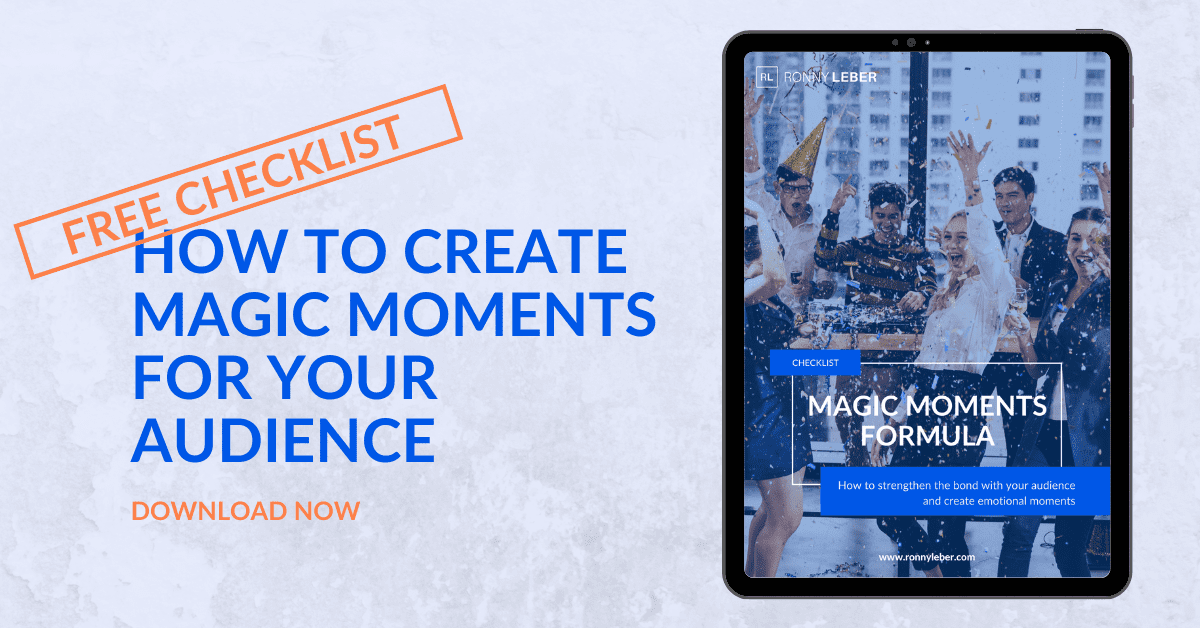
Stop guessing how to WOW your audience!
We will send you our secret ingredients to WOW your audience for free! In the MAGIC MOMENTS FORMULA you can learn how to take any audience of any size and create a deep emotional experience for them in order to create a deeper emotional bond with you and your brand.
What makes a good emcee at a successful event?
Professional moderation not only optimizes the experience for the audience, it also strengthens the impression of the event, because one of the goals of every event is to be remembered in the long term. The host gives the event a structure and takes the audience on a journey. He is the link between what is happening and the audience. He explains and guides along the red thread of the event. The presenter gives the whole thing a face and, if something goes wrong during the event, he can have a regulating effect.
With the goal of an event to be remembered for a long time, a professional host helps to optimize the experience for the audience. The host gives structure to the event and takes the audience on a journey. Share on XWhat is the task of an event host?
Now let’s come to your task and your understanding when hosting events. As an event host, I always see myself “serving” the audience – we are service providers. For me, hosting and creating a memorable event is a service to the customer. The primary goal of a good presenter should be: to serve the purpose of the event and bring it closer to the audience.
The primary task of a presenter is to serve the audience. It is a service with the aim to serve the event and bring it closer to the audience. Share on XThe role of the event host is multifaceted. Any event, be it in person events – from a charity event to whatever your next event is – virtual events, or even hybrid meetings, need a structure so that the entire event can be used most effectively. The same is true for meetings, of course.
As a side note for everyone working in event planning and event management: in my experience it absolutely makes sense to bring in the event host as soon as possible into the whole event management cycle. When planning future events it does make sense to take a look at the event venue for a live event together with your host or go through the virtual event platform for a successful virtual event.
The event host can act as a
- communicator through the agenda, skilfully managing time, processes and structure.
- He or she is a link between the guests and mediates between them in case of different perspectives. As a moderator, one should remain neutral as much as possible.
- An event host motivates the attendees and invites discussion to get the audience engaged and people excited.
- He masters various techniques of good communication when moderating
- His tasks also include bundling emotions in order to guarantee an even more emotional experience for the viewers
- He has an eye on the time and thus ensures an optimal flow.
How to prepare to host a successful event
Good preparation makes all the difference. It is important that you do not go into a moderation unprepared. You should consider the following two points before the event. This way you are well prepared, which gives you a certain amount of security and your nerves are not shot from sheer nervousness. This, in turn, will be felt by the guests you take with you on a journey and they will thank you with maximum engagement.
Keep the goal of the event in mind

First of all, discuss the goal of the workshop, kick-off conference or hybrid presentation with your client. Setting the goal is one of the most important requirements for a successful event hosting. One of your tasks is to present the goal in a way that is understandable to the participants, like a common thread.
Know your audience
In order to know the rules of the game and how to inspire your audience, you need to know what makes them tick. Find out beforehand who is sitting in front of the stage.
Do you have a homogeneous audience of the same age and perhaps the same profession? Where are they from – from your city or potentially a global audience?

Are they perhaps only executives or entrepreneurs? And what expectations do the participants have of this round? And what about emotional involvement?
The better you know your potential attendees or virtual participants, the better you can respond to them and tailor your wording to them. You can then pick them up where they are and take them on a journey. They will trust you and enthusiastically follow your presentation.
9 hosting tips for your next event
Now I’m going to dig deep into my bag of tricks and tell you my nine best moderation tips. These tips are the basis for many successful presentations and include important hosting techniques that I’ve adopted in order to present optimally at meetings and events time and time again.
1. Find your place on stage
Already during the preparation, find the ideal place on stage for you. Ideally, it should be in the center of the stage. If possible, check out the event venue in advance to get a feel for the space.

Familiarize yourself with the stage and visualize the success of your presentation. Give life to the room in your imagination and look for anchor points where you can calm down again and again in the course of your moderation.
Often an inexperienced presenter will place themselves a little too far back on stage. Jump over your shadow, quietly shed your shyness, and take a step toward the participants. This will give you better control of the room.

One of my top tips for hosting meetings: Since in many cases the participants sit around a table, it is important to reserve your seat in advance. Ideally at the head of the table, because from here you can observe everyone well and thus best steer the meeting as a moderator to get maximum engagement.
2. The perfect first impression as an event host
It used to be assumed that people form their first impression within 7 seconds… recent studies show that this already happens within a few tenths of a second. And yes: the first impression counts. Once it’s screwed up, you have to work uphill from now on. Don’t let it happen in the first place. Communication begins the moment you are first noticed by the audience, before you have even said a word.
The first impression counts. Once it's screwed up, it's an uphill battle from there. Communication begins the moment you are first noticed by the audience, before you have even said a word. Share on XIt is essential that you get yourself into an ideal state even before you go on stage. Warm up your voice through targeted voice training. The fire that you want to ignite in your participants must burn within you. Connect with your inner self-confidence. Remember your goal from your time with your audience. Also be aware of your entry point into your presentation. And off you go.
Don’t just rush on stage and start your presentation before you have really arrived. Give yourself time to arrive. And above all, give your audience time to notice you. Be sure to make eye contact. This is where the basic human instincts come into play. The person with the most confidence wins.
This is an approach to each other, as you often have when you face an animal for the first time – first build up a feeling for each other. You will be amazed at how effective such a stage performance can be. Come in confident and dynamic and wait with your introduction until you have the attention of your audience. This will also enhance your charisma and stage presence.

My top tip for hosting an event:
Make sure that you appear with music on stage. This gives the whole performance more presence and automatically gives you more momentum and a better start with your participants.
3. How to make your performance a success
At this point it is important to mention again that as a presenter you are a service provider. Because of this self-image, it is more important for me to focus on the goal of the event rather than on myself. Some time ago, when I did the warm-up for several episodes for a TV production in front of a live audience, the producer came to me after the first job to tell me that he was very pleased with the way the warm-up was done. Flattered and at the same time curious, since I didn’t feel I had done anything particularly innovative, I asked if it wasn’t “normal” anyway. In response, he told me, “You wouldn’t believe how many presenters fail because they want to pull off their show and completely forget about the audience.”
As a rule, the participants don’t care who guides them through the program as a presenter. At least not up front. An American proverb says, “Your audience doesn’t care how much you know until they know how much you care.” One of the most important tips is to put your audience first. If you don’t know who your audience is or don’t care about them, then the best presentation techniques won’t help.
As for the actual introduction itself: since your participants will probably ask themselves who is going to lead them through the course of events, the show or possibly discussions, it is important to mention your name here. Especially, since you also live from increasing your own popularity. But what is the best way to do that? I always prefer to start with something where I immediately get the attention of my audience to pick them up accordingly… before the actual greeting where I then also mention my name.
4. Where do the hands go when hosting events?
“What do I actually do with my hands?” This is a question many presenters ask themselves at the beginning of their career. Non-verbal communication is the high art of a top event host. Here we first of all differentiate the area of action of the hands into three areas:
1. Passive area
Below the belt, we are talking about the passive action space of the hands. There is not really much happening here. The arms and hands dangle down the side of the body like two long sausages. Even the body tension here is usually only a little more than with a wet sack. With this posture you hardly sweep your participants off their feet. For this reason: please do not.
2. Active area
Between belt and shoulder line is the active area. In this region the great art of active body language with arms and hands takes place. Here you have the opportunity to actively influence your audience. I like to compare this with couple dancing: if you want to lead your partner, your hands have to be in an active area. The prerequisite is of course the appropriate body language. The same is true for a good facilitator.
3. Area of the supernatural
This is when you keep your hands primarily above the shoulder line. This is always good if you are preaching “Urbi et Orbi” or “Ora et Labora”… but if you are neither a priest nor the pope and your guest list does not include the who is who of the local YMCA, then please use this sphere very sparingly.
What do the hands of a presenter do?
The hands serve to illustrate what you are saying. They are meant to emphasize what you are saying. Here, above all, appropriate body tension is essential. At the same time, the arms and hands also serve to guide your participants.

If you are the moderator of a meeting or a discussion, the hands are even more important because you can influence the other participants non-verbally.
Should I have my hands free as an emcee?
As an event host, you should not have anything in your hands that is not absolutely necessary. If you are working with a handheld microphone, then of course the microphone belongs in your hand. Likewise the moderation cards. If you use a headset microphone, you have at least one hand free. Even with moderation cards, please use this hand as the “pointing hand” – the hand that gestures accordingly.
What do the hands do in virtual meetings and a successful virtual event?
Before you start hosting virtual events, familiarize yourself with what can be seen of you on the screen so that you look good in front of the camera. How far can you move your hands up, down and to the side to still be in the picture: this is your work environment, because this is where you will be seen.
Basically, your movements will be smaller in virtual events. However, the effect will not be less – the camera will make sure that you cut a good figure as a virtual event presenter for online events. To get ready for your next virtual event you can find more video conferencing tips here.
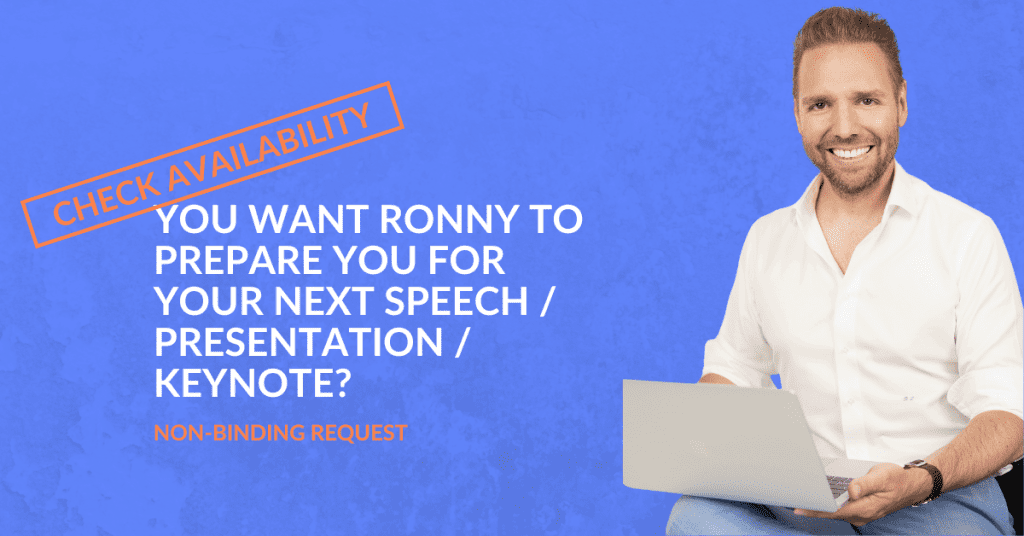
Ask Ronny to coach you for your next performance
Click on the button and send a non-binding request to Ronny to be your coach for your next keynote, speech or presentation.
5. How good moderation texts are created
Good texts that accompany your moderation are created with a lot of diligence and good research. If we break down the texts for moderations, we are usually left with the following:
- Introduction
- Farewell
- Transition
- Introduction
- Interview
Everything you say as a presenter has the overall purpose of getting the participants from point A to point B. That’s what this is all about.

To do this, again, first and foremost, you need to be aware of who your audience is and what the goal of the event is. The texts then form a common thread through the event.
How do you create the ideal introduction?
The goal of the introduction is to get your audience in the mood for a topic, a guest or a show act. It should be entertaining, informative and ideally also entertaining. As a presenter, you have the following options, among others:
- Quote
- Question
- Parable
- Story
- Vote
- Numbers, data, facts
What should a moderation definitely fulfill?
The closing is often the most underestimated part of preparing a presentation…yet it can be the most important! The reason for this is that it gives you another opportunity to leave your audience with a call-to-action. This “call-to-action” is strongly aligned with your defined goal of the event or meeting.
What are the best tips for a transition during the moderation?
A transition often works analogously to an introduction. Here it is about connecting two parts of an event. This can be, for example, two speakers coming one after the other or a comedian followed by a charity auction. In any case, think about how to get your audience from the mood of part A into the mood for part B. Especially at a conference, where there are a lot of program items on the agenda, you will often have to do a transition.
How do I make the perfect introduction?
Very deep in the bag of tricks of moderation techniques for an event host are the possibilities of introductions. Here it is basically important to present another person in a dignified way. What I quite like to do is to first tell something about the person and at the very end of the sentence, as with a flourish, first mention the name and then pause. This gives the audience time to respond with applause.
Tips for conducting an interview
As a presenter, it happens to you all the time that you have to conduct an interview. For example, you may have to briefly interview the organizer, you may have to welcome a star guest on stage, or you may have to conduct a panel discussion. Ideally, you should think about your questions and the best sequence in advance so that your audience can follow you easily. Your questions should have a common thread – this is the best way to develop a dynamic conversation. Another tip: if possible, exchange a few words with the person you are interviewing in advance to break the ice. You may also be able to go through the questions together.
6. How do you deal with disruptions and incidents?
I describe my job not only as a presenter, but also time and again as a “flexible presenter”. Live is live and anything can happen – especially in times of live streaming and high tech. The most important tip to take the participants with you is to be yourself on stage. As soon as something unexpected happens, think about how you can take advantage of it.
I’ll give you an example: Years ago I moderated an event where the next speaker was supposed to present a website. When he clicked on the first subpage in the menu, he suddenly got “Internet Connection failed” – no Internet. At that moment I was wondering if this was something that could be done in 1-2 seconds, or maybe it would take longer. Since I assumed that this could take 1-2 minutes and a long silence would probably take all the air out of the event, I went into action. I just started to ask one question after the other about what we can expect from this website, how it is built and so on. So the time was quickly bridged and the Internet was up and running again. One of the results afterwards was that I got my best feedback for this handling of incidents.
7. How do you learn the art of eye contact as an event host?
One of your jobs as a presenter is to connect with your audience during your presentations. The easiest way to reach a participant is with eye contact. It is important that each participant feels reached.

The best way to do this is to imagine a “W” on the seating plan and then first reach all corners of the “W” with your gaze. As the presenter, dare to look your audience in the eye and have fun doing it. If you don’t look at anyone, then all the moderation techniques won’t help you… you won’t be heard by your audience.
8. How to deal with stage fright?
Most presenters have experienced stage fright during their presentations – it’s part of the game and positive tension is a good thing. But if you suddenly find yourself standing rigidly in front of your audience like a deer in the headlights, then you need to change something. Fortunately, there are moderation techniques that will help you not to stand on stage completely headless with stage fright.

First and foremost, good preparation will help you. The better prepared you are, the more confident you will be. With every presentation, your performance as a presenter becomes more rounded. In my blog post on “How to overcome stage fright” I dedicated myself to the topic of stage fright. Here I answer questions and give many tips around the topic of stage fright.
My top tip:
Be aware that stage fright generates energy. In the first minutes of your performance you will be carried by this energy, you will feel the air burning with tension and energy. For me, the first minutes as a presenter on a stage during a workshop with the first eye contact with the audience are always something very special. You feel that you are alive and that often creates great energy.
9. Get familiar with the technique
Avoid technical difficulties that bring you out of your flow. That counts even more when you want to host a successful virtual event. Familiarize yourself with the technique already in the preparation phase. You should know where the mic goes on and who your contact person is if a question about the technology arises during the presentation.

Do a sound check and move around to prevent possible feedback. It is also important to know where the stage is best lit and where you should not stand, because otherwise you might stand with a part of your head in the light of the beamer.
My personal tip from my long experience as a presenter to you:
Becoming a presenter is a personal process. This usually does not happen overnight. It takes time and getting used to different roles on stage or in meetings.
On your way to becoming an ideal presenter, always stay authentic and try to find your own style. You are welcome to take a cue from your role models – the important thing is that you don’t become a copy, but still keep your personal touch. And last but not least, one very important point: have fun!
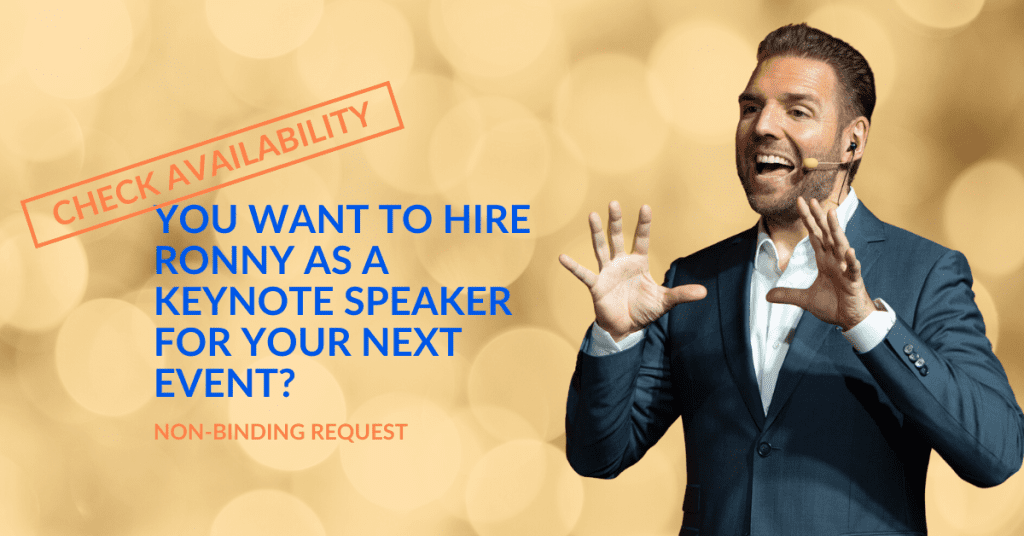
Request Ronny as moderator for your next event without obligation
Simply click on the button and ask Ronny as moderator for your next event, your next gala, your next corporate event without obligation
Here’s how I can help you become a better event host
Becoming a good presenter is not rocket science. With the right techniques, practice and attitude towards life, you can rock any discussion, workshop or even many events as a presenter. It often helps to focus on certain topics as a presenter in the beginning.

An important tip should you want to pursue a professional career as an event host, get yourself into their environment – successfully networking can help you a lot here. If you are interested in personal support or stage coaching on the way to becoming a presenter, please contact me.
Have you ever had an experience as a presenter? What is your personal moderation tip? Feel free to post your answer below in a comment.


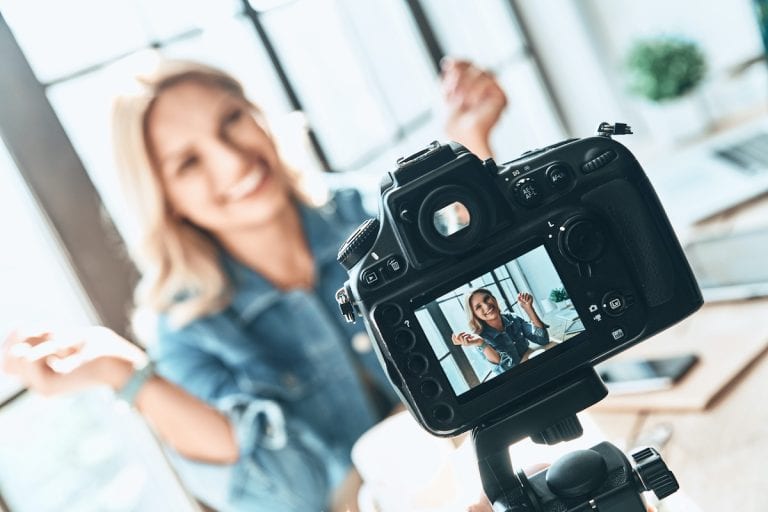

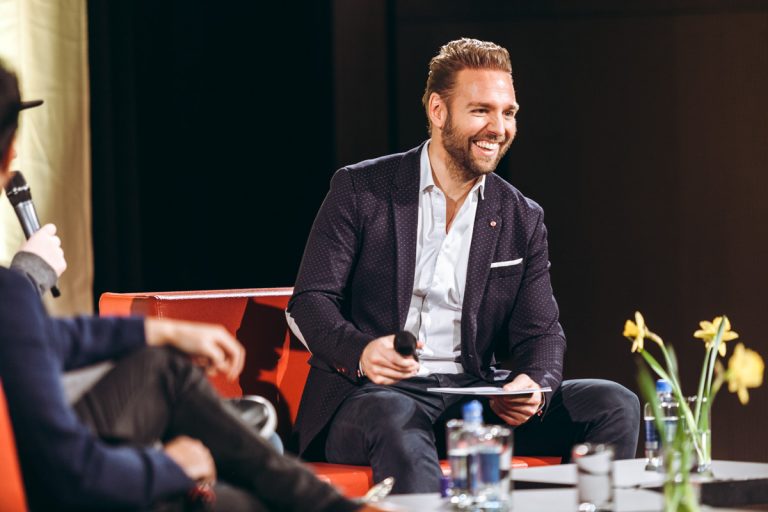

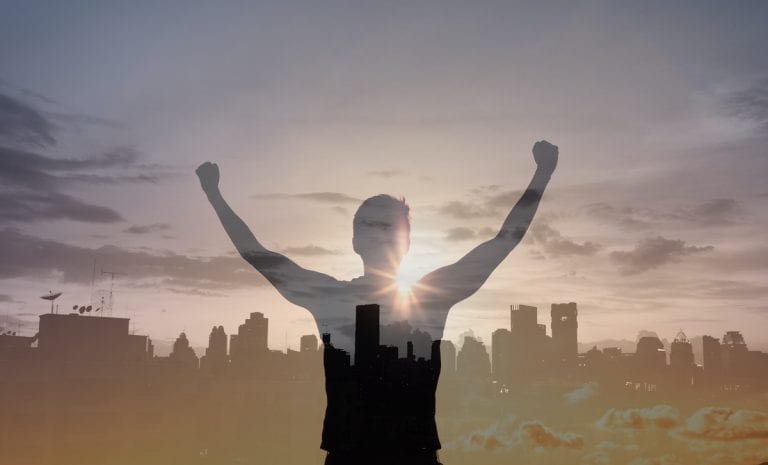


 Contact
Contact








Thank you for sharing this amazing blog. These insights will surely help us make our upcoming events even more successful and enjoyable for everyone involved. We appreciate of your valuable advice.
You are welcome! It’s been a pleasure. All the best for your upcoming events!